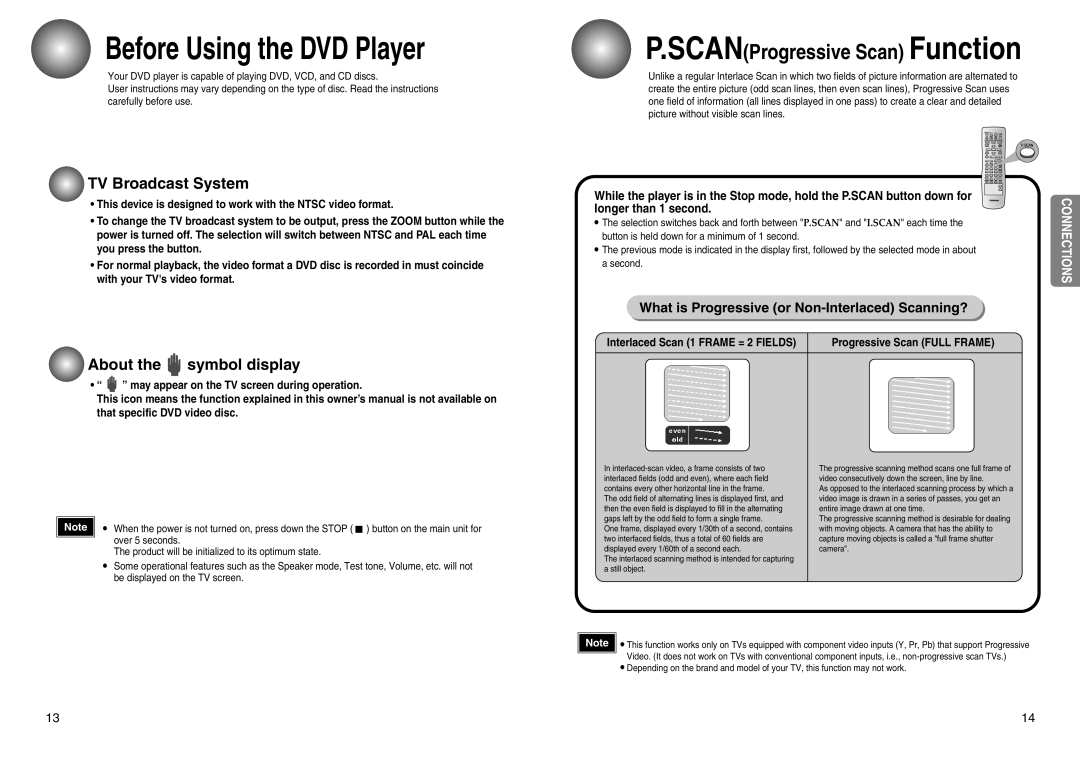
Before Using the DVD Player
Your DVD player is capable of playing DVD, VCD, and CD discs.
User instructions may vary depending on the type of disc. Read the instructions carefully before use.
P.SCAN(Progressive Scan) Function
Unlike a regular Interlace Scan in which two fields of picture information are alternated to create the entire picture (odd scan lines, then even scan lines), Progressive Scan uses one field of information (all lines displayed in one pass) to create a clear and detailed picture without visible scan lines.
 TV Broadcast System
TV Broadcast System
•This device is designed to work with the NTSC video format.
•To change the TV broadcast system to be output, press the ZOOM button while the power is turned off. The selection will switch between NTSC and PAL each time you press the button.
•For normal playback, the video format a DVD disc is recorded in must coincide with your TV's video format.
About the symbol display
•“  ” may appear on the TV screen during operation.
” may appear on the TV screen during operation.
This icon means the function explained in this owner’s manual is not available on that specific DVD video disc.
Note | • | When the power is not turned on, press down the STOP ( | ) button on the main unit for |
|
| over 5 seconds. |
|
|
| The product will be initialized to its optimum state. |
|
•Some operational features such as the Speaker mode, Test tone, Volume, etc. will not be displayed on the TV screen.
While the player is in the Stop mode, hold the P.SCAN button down for longer than 1 second.
•The selection switches back and forth between "P.SCAN" and "I.SCAN" each time the button is held down for a minimum of 1 second.
•The previous mode is indicated in the display first, followed by the selected mode in about a second.
What is Progressive (or Non-Interlaced) Scanning?
Interlaced Scan (1 FRAME = 2 FIELDS) | Progressive Scan (FULL FRAME) |
In | The progressive scanning method scans one full frame of |
interlaced fields (odd and even), where each field | video consecutively down the screen, line by line. |
contains every other horizontal line in the frame. | As opposed to the interlaced scanning process by which a |
The odd field of alternating lines is displayed first, and | video image is drawn in a series of passes, you get an |
then the even field is displayed to fill in the alternating | entire image drawn at one time. |
gaps left by the odd field to form a single frame. | The progressive scanning method is desirable for dealing |
One frame, displayed every 1/30th of a second, contains | with moving objects. A camera that has the ability to |
two interfaced fields, thus a total of 60 fields are | capture moving objects is called a "full frame shutter |
displayed every 1/60th of a second each. | camera". |
The interlaced scanning method is intended for capturing |
|
a still object. |
|
![]()
![]() Note
Note ![]()
![]() • This function works only on TVs equipped with component video inputs (Y, Pr, Pb) that support Progressive Video. (It does not work on TVs with conventional component inputs, i.e.,
• This function works only on TVs equipped with component video inputs (Y, Pr, Pb) that support Progressive Video. (It does not work on TVs with conventional component inputs, i.e.,
•Depending on the brand and model of your TV, this function may not work.
CONNECTIONS
13 | 14 |
